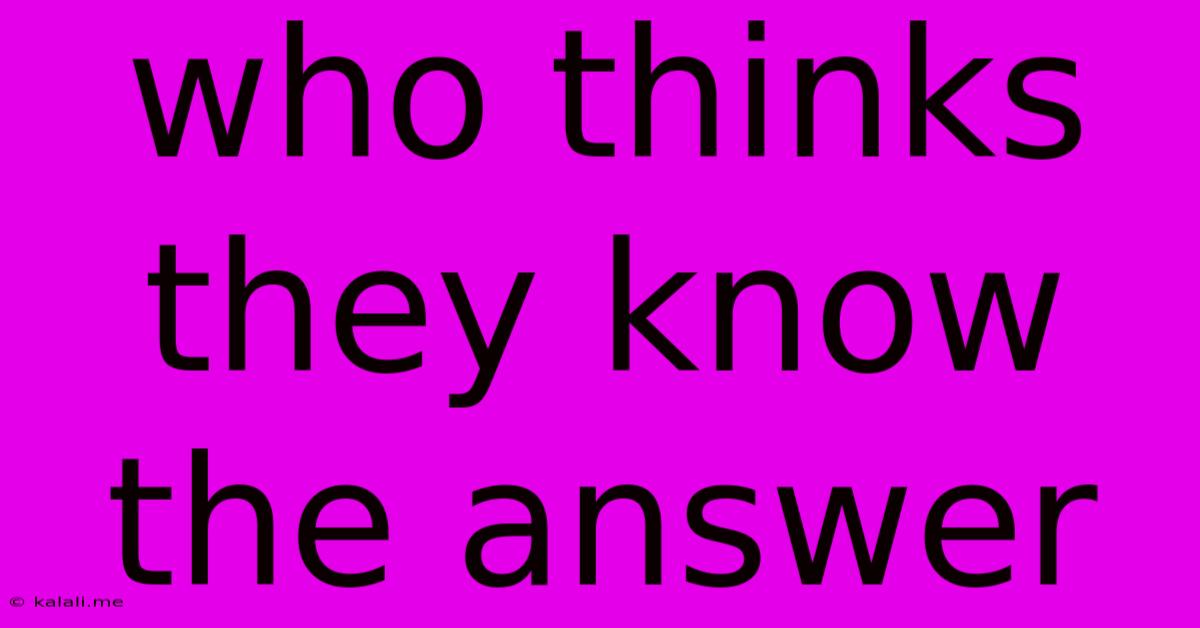Who Thinks They Know The Answer
Kalali
May 26, 2025 · 3 min read

Table of Contents
Who Thinks They Know the Answer? The Dunning-Kruger Effect and Its Impact
Meta Description: Explore the Dunning-Kruger effect – the cognitive bias where people with low ability overestimate their competence. Learn how this affects decision-making, relationships, and workplace dynamics, and discover strategies to combat its influence.
We all encounter them: individuals who confidently assert their knowledge, even when demonstrably wrong. This isn't simply arrogance; it often stems from a fascinating cognitive bias known as the Dunning-Kruger effect. This article delves into the psychology behind this phenomenon, its real-world implications, and how we can mitigate its impact on ourselves and others.
Understanding the Dunning-Kruger Effect
The Dunning-Kruger effect describes a cognitive bias where individuals with low ability at a task overestimate their ability. Conversely, highly competent individuals tend to underestimate their relative competence. This creates a skewed perception of skill, leading to inaccurate self-assessments. The core issue isn't simply a lack of knowledge; it's the inability to recognize that lack of knowledge. Someone suffering from this effect lacks the metacognitive ability to accurately assess their own performance.
Think of it this way: a novice painter might believe their artwork is masterful, lacking the expertise to recognize its flaws. Meanwhile, a seasoned artist might undervalue their own skills, comparing themselves to even greater masters.
Real-World Manifestations of the Dunning-Kruger Effect
The impact of the Dunning-Kruger effect extends far beyond artistic endeavors. It plays a significant role in:
- Workplace Dynamics: Ineffective team members may overestimate their contributions, hindering progress and frustrating colleagues. Conversely, truly skilled individuals might hesitate to speak up, fearing their input will be undervalued.
- Decision-Making: Individuals prone to this bias may make poor decisions based on inaccurate self-assessments, potentially leading to negative consequences. This is particularly dangerous in fields requiring high levels of expertise, such as medicine or finance.
- Relationships: Overconfidence in one's understanding of others can damage relationships. Misinterpretations and communication breakdowns often stem from an inaccurate self-perception of interpersonal skills.
- Online Interactions: The anonymity of the internet can exacerbate the Dunning-Kruger effect, leading to confidently expressed misinformation and unproductive arguments. The echo chambers created by social media further reinforce this bias.
Combating the Dunning-Kruger Effect
While completely eliminating this cognitive bias is impossible, we can implement strategies to mitigate its effects:
- Seek Feedback: Actively solicit feedback from trusted sources, even if it's uncomfortable. Constructive criticism is crucial for accurate self-assessment.
- Embrace Humility: Cultivate a mindset of continuous learning and recognize that there's always more to learn. Acknowledge your limitations and actively seek to expand your knowledge.
- Develop Metacognition: Practice reflecting on your thought processes and decision-making. Ask yourself: "How did I arrive at this conclusion? What evidence supports my belief?"
- Surround Yourself with Experts: Learn from those more knowledgeable than yourself. Their perspectives can help you gain a more accurate understanding of your skills and limitations.
- Practice Self-Doubt (Healthily): A healthy degree of self-doubt can be a powerful tool. It encourages critical thinking and a willingness to learn and adapt.
Conclusion: The Importance of Self-Awareness
The Dunning-Kruger effect highlights the critical importance of self-awareness. By acknowledging our potential biases and actively seeking self-improvement, we can navigate the complexities of life and work more effectively. Understanding this effect allows us to identify its manifestations in ourselves and others, leading to improved communication, better decisions, and stronger relationships. Ultimately, recognizing our limitations is the first step towards achieving true competence.
Latest Posts
Latest Posts
-
Can I Take Aerosol On A Plane
May 27, 2025
-
No Slip Condition Formula For The Derivative
May 27, 2025
-
How Long Is Cream Cheese Good For After Expiration Date
May 27, 2025
-
What Does It Mean When Someone Says
May 27, 2025
-
Another Word For A Blow Job
May 27, 2025
Related Post
Thank you for visiting our website which covers about Who Thinks They Know The Answer . We hope the information provided has been useful to you. Feel free to contact us if you have any questions or need further assistance. See you next time and don't miss to bookmark.